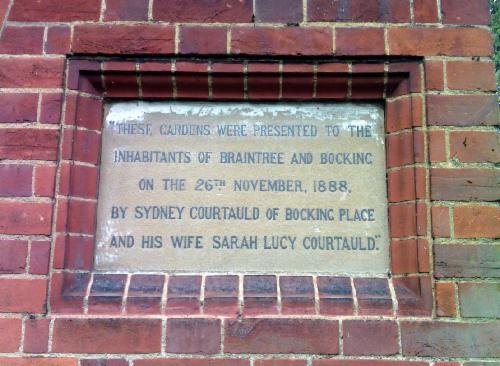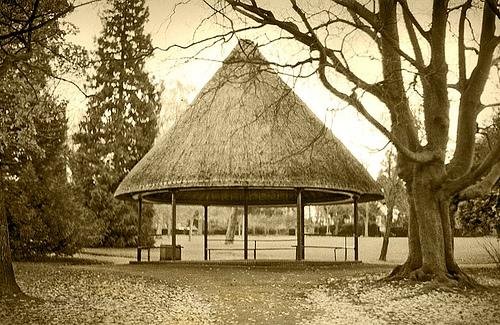Our History
The gardens were donated by Sydney Courtauld in 1888

Sydney Courtauld
Fun in the Gardens, c.1906, showing the windmill that pumped water to the lodge.
Commemoration plaque
The lower garden pond
The bandstand
Sydney Courtauld was the nephew of Sam Courtauld, who founded what was to become the largest textile manufacturer in the world. Sydney started to work for the business in 1870. He was born on 4th April 1840
As a result of the early death of Prince Albert in 1861, Queen Victoria decree’d that the country should go into Mourning and mourning meant the wearing of Crepe (called crape by Courtaulds), that black crimped silk material, worn to respect the dead, and Samuel Courtauld & Co virtually had a monopoly in making this material and thus prospered very greatly. They had developed the skill of making it early in the century, and because of it had survived the free trade measure in 1860, when the Palmerston government brought in a treaty with France, allowing French silk to be imported free of duty. This caused many English silk manufacturers to go out of business, but Courtaulds were able to survive through crape which France was unable to make.

From the time of his entry into the business, Sydney rose to be in charge of Engineering at the Bocking and Braintree factories. From 1886 – 98 the business suffered a serious downturn such that had never been experienced before, but this was the moment when Sydney decided to give his garden to the people of Braintree. Living at Bocking Place, he conceived a great idea. Although he built a new house on the same site in 1887, the garden was the same.
Across the Causeway road was another part of the garden of Bocking Place and Sydney seeing the thundering horse drawn traffic up the Causeway, determined to make an area for people, particularly children, could walk more safely and “whither the tired mechanic could resort, with his wife and children and where the industrious tradesman could escape for a brief spell from his cares and worries of business”. What we see today is his legacy to the people of Braintree & Bocking.
An excellent booklet entitled “Whither the tired mechanic could resort” by historian Michael Bardell is obtainable from Braintree Museum or The Gardens Coffeehouse price £5 – all proceeds go to Braintree & Bocking Public Gardens Trust, and gives the history of the Gardens and how they developed



